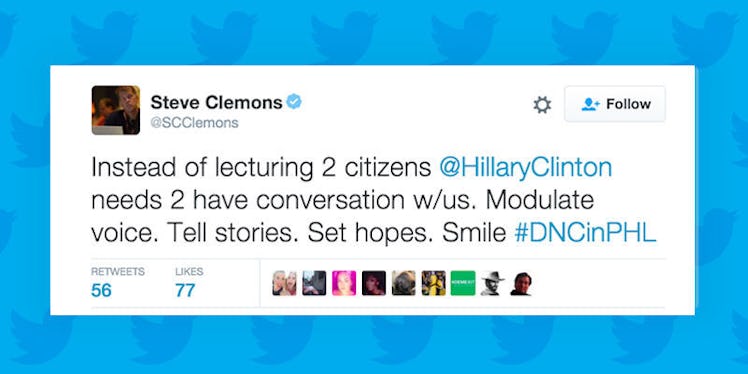It is the clichéd bit of sexism that, apparently, will never die: men telling women to smile.
Despite the fact that women have been calling out men who tell them to "smile" repeatedly for years, many men still can't seem to stop doing it. It's pretty shocking, at this point. I mean, you'd think they'd at least refrain from doing it solely for the sake of self-preservation and divert their sexist urges to vaguer and more insidious microaggressions.
But, apparently, the idea that a woman needs to be constantly cheerful, open-faced and unthreatening is firmly stitched into the minds and personalities of millions of men.
Back in March, even MSNBC host Joe Scarborough told Hillary she needed to smile.
The fact is, no one is telling Donald Trump or Bernie Sanders they need to smile more. (Although Biden should really smile less — whenever I watch his speeches I feel like he's flirting with my mom.)
The public expects Hillary to be motherly and strong, cheerful and commanding, experienced but not old, well-dressed but not too well-dressed, funny but serious, a cat and a dog, fire and water, team Edward and team Jacob.
For women in politics (and the workplace and the world in general), the game is, essentially, pretty rigged.
Last night, Hillary gave her DNC acceptance speech after a pretty remarkable convention (my hopes for it three days ago were "please just don't let anyone die in a fire"). And, as BuzzFeed reported, men on Twitter began telling her she should smile.
We should have expected it.
And when she did smile, men would Tweet that her smile was "fake."
So, basically, she's "too harsh" when she doesn't smile, and "fake" when she does. Whatever your politics, or your opinion on Hillary, it's important to recognize how prevalent thinking like this is.
Most notably, political blogger Steve Clemons wrote this Tweet, which sparked off a Twitter storm from shocked and rightfully pissed off women.
It's almost too much of a cliche that a woman who has just literally made history by being made the official democratic candidate for president, should be told to smile in her acceptance speech.
Steve Clemons was quick to realize his mistake (admittedly with the aid of hundreds of people telling him to go fuck himself) and began rapidly tweeting apologies.
If we are to take his word for it (meaning he is just trying not to get crucified by the internet for his sexist display), what happened displays so clearly the mechanism of male privilege. For Steve Clemons — and millions of other men — the idea that it is acceptable to tell a woman that she should smile more (which is just code for "be more like what I think a woman should be like") has rarely ever been challenged.
So when that behavior finally is challenged, a smart person can quickly recognize how problematic language like that is. Male privilege is essentially a problem of exposure. Misogyny is cultivated when men are kept from being (or do not allow themselves to be) exposed to non-male perspectives.
You can literally watch him learn why what he did was wrong as the night goes on.
Although, of course, another way to see this is that he just realized he was losing the battle. Honestly, although less preferred than "comes to understand," that works too.
But by the end of the night, his tone had changed.
Unfortunately, it is a rare occurrence that hundreds of people will get together and force you (through the gauntlet of social humiliation) to learn to recognize your own male privilege. So our only real hope is to learn by example.
Honestly, I do not take pleasure in joining in on the free-for-all against people like Steve Clemons, who did something so many others have and will continue to do — and is a rare example of someone who would (mostly) apologize for it — but the thing is, he has provided us an important example of how entrenched these sexist sentiments are. And we have to bring attention to those examples in order to help expose those dangerous and usually unchallenged ways of thinking.
